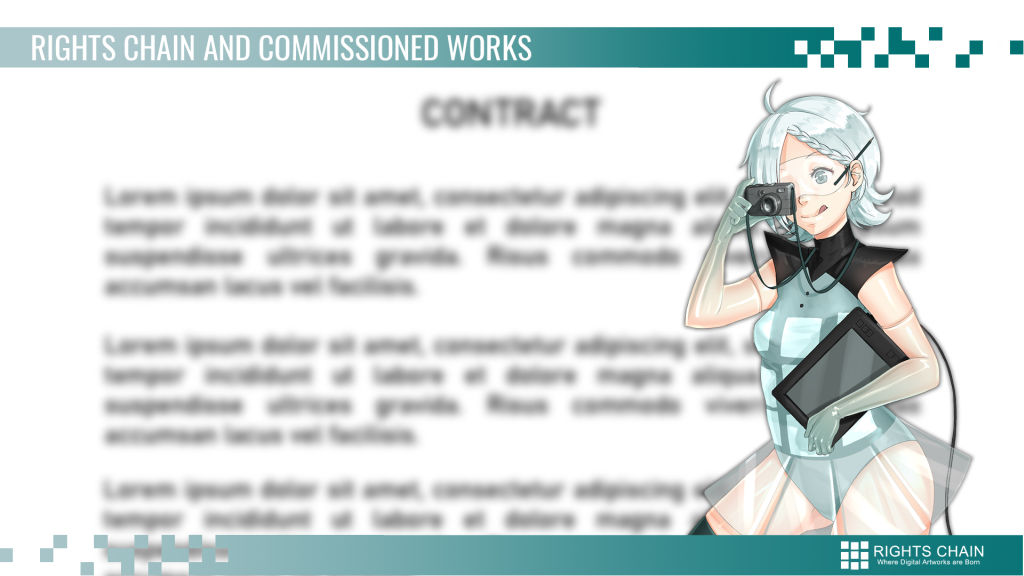Why using Rights Chain? Commissioned works

- 2021-03-16
- Sebastian Zdrojewski
- Copyright
When we talk about authors, it is common to associate the idea of a book or a comic book made by their authors, fruit of their imagination or, in the case of ghost writers, of those who commission the work.
Truth is, there are many different types of works delivered on commission. A commissioner has an idea in his or her mind, contacts an artist, shares his idea and requests a work on commission.
To those who delivers the commission it means putting their creativity at work and getting paid for it.
Easy, isn’t it?
As far as the commission is used for personal means this really are pretty easy. Who wouldn’t like a piece in their collection that is truly unique?
When a creative work is commissioned for commercial purposes, things changes, and it happens – way too often – that the artist gets abused for his or her work.
We can list a few examples of happenings we got reported about in the past months:
- use of illustrations found on search engines to print merchandising
- use of illustrations or drawings as corporate logos
- work attribution (mostly on photos)
And those are only the most common examples we get involved with.
When an author is asked for a commission, they have the right to ask if the work will be used for personal means, or whether it will be used for commercial purposes.
Some examples of commercial uses may include:
- merchandising and gadgets
- prints
- digital copy sales (e.g. “pay for download)
- commercials
A copyright violation can occur years after a content is uploaded or published: we’re currently observing a situation on a work infringed in 2016 after it was published in 2013!
Creative works can assume different formats:
- illustrations
- photos
- texts (articles, blogs, books, etc.)
How do you start managing your rights on commissioned works?
What kind of copyright license should I use on a commission?
Legal terms are complicated, intricated and sometimes out of reach for many. So we should start distinguishing the two types of purposes of a commissioned work: commercial and non-commercial use.
Commissions designated for commercial purposes
A work commissioned for a commercial purpose will be a source of income for the commissioner. For this kind of works a contract should be signed between the parties to regulate the terms and conditions that defines the economic rights transfer from the author to the commissioner. In other words, the new rightsholder can use commercially the commissioned work.
Usually works for commercial purposes are delivered at a higher price by the artist.
Commissions designated for non-commercial purposes
Should the commission not be designated for a commercial purpose, we suggest two ways:
- a typical all rights reserved formula, meaning the author retain all the rights on his or her work, and the commissioner uses the work in a “fair use” condition (which does not involve an infringement)
- a Creative Commons license chosen between BY-NC-ND or BY-NC-SA: both licenses forbid the use of the work for commercial purposes, while they can be shared or distributed as far as the Author is correctly attributed (ideal, for example, for sharing over social media or other channels)
Attribution
Moral rights of the author neither are nor can be transferred. Should the use of a work violate or damage author’s moral rights, the author can invoke his or her rights and request the immediate termination of the use. Recently we had examples of authors requesting the immediate termination of use of their works during different political campaigns.
Rights Chain Platform
The Rights Chain Platform gives Artists and Businesses a simplified set of tools for copyright management and transfer of rights.
Rights Chain for Artists
Artists can register their works in a simple yet effective way, associating a copyright license. A certificate of registration is immediately available to the author and can be used any time should the need arise to show the type of license associated or who is the rightsholder.
For more information on our services dedicated to artists click here.
Rights Chain for Business
For businesses commissioning works to artists outside their organization, Rights Chain created rcRMS: a tool that simplifies the transfers of digital assets and rights between creators and business entities.
For example, using rcRMS it is possible to obtain in real time a list of rights on all the contents transferred using the platform to comply with the new EU directive 2019/790 on copyright and related rights in the Digital Single Market.
For more information on our rcRMS platform, click here.
For commissioners
Authenticity of a commissioned work is something shouldn’t be underestimated. Throughout Rights Chain the individual, or company, that commissions a work to an author can verify whether the work is original.
In the digital era, news of works being sold by scammers happens way too often.
Disclaimer
- The opinions expressed in this content DO NOT REPRESENT legal advice whatsoever
- Authors in external links and/or referred to in this article are not affiliated nor collaborating with Rights Chain. Any opinion or content is property of its' respective owners.
